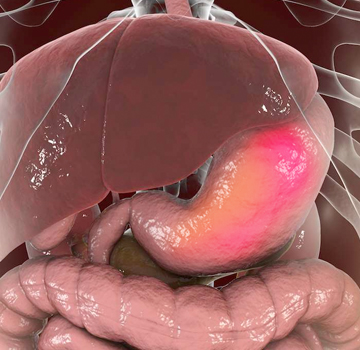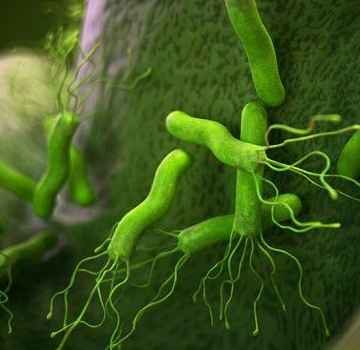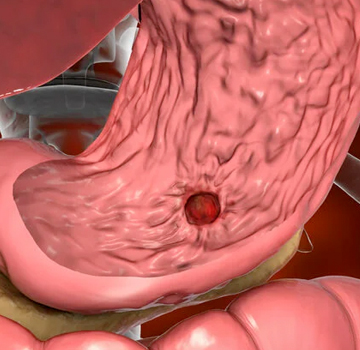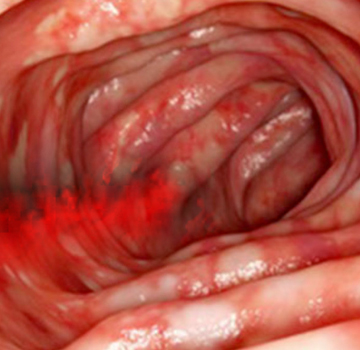Stomach
Diseases
Gastritis
It is an inflammation of the gastric mucosa, which is the layer of cells that lines the stomach on the inside, protecting it from the acidity of gastric juices. Although it is not correct, the term gastritis is often used as a synonym for dyspepsia (pain or discomfort in the upper abdomen, as well as symptoms of burning, pressure or fullness often related, although not necessarily, to food). Depending on its duration over time, it can be acute or chronic gastritis.
Symptoms: Poor digestion, bloating, heartburn, nausea and vomiting, loss of appetite, dark colored stools.
Helicobacter pylori
Es un tipo de bacteria que causa infecciones en el estómago, puede presentarse sin saberlo y ser la causante de fuertes malestares estomacales. Se encuentra, aproximadamente, en dos tercios de la población mundial. Es posible que se transmita por agua y alimentos contaminados. Puede ocasionar desde dolorosas gastritis, úlceras pépticas o, si no es tratada a tiempo, cáncer de estómago.
Síntomas: Dolor o ardor en el abdomen, dolor abdominal más agudo con el estómago vacío, náuseas, pérdida de apetito, eructos frecuentes, hinchazón, adelgazamiento involuntario.
Gastric ulcer
A gastric or peptic ulcer is a sore in the mucosa that lines the stomach or duodenum, which is the first part of the small intestine. The most common symptom is a burning stomach.
The pain can: Come on between meals or at night, go away after eating something or taking an antacid, last minutes or hours, come and go for several days or weeks, peptic ulcers occur when acids that help digest food damage the walls of the stomach or duodenum.
The most common cause is Helicobacter pylori infection. Another cause is prolonged use of nonsteroidal anti-inflammatory drugs, such as aspirin or pain relievers such as ibuprofen and naproxen. Stress and spicy foods don't cause ulcers, but they can make them worse.
Gastrointestinal bleeding
It is the blood loss in the gastrointestinal tract, above the angle of Treitz, which is the anatomical part of the small intestine that separates the lower and upper intestine, it is one of the main gastroenterological causes in the emergency and consultation department, it can have different origins.
por ejemplo:
for example: Peptic ulcer disease, Gastrointestinal erosion, varicose veins, Mallory Weiss tears, esophagitis, duodenitis, prolonged intake of NSAIDs
The most common causes of this disease are peptic ulcer disease, erosive gastritis and esophageal varices.
Digestive process
Simple substances are absorbed by the intestinal villi, which are lining the small intestine. From there, through a complex process, they pass into the blood and are then distributed throughout the body to ensure an adequate supply of energy and nutrients to all cells.
The digestive process begins in the mouth and ends in the anus and the esophagus, stomach, small intestine, colon and rectum are considered components of the digestive system.










